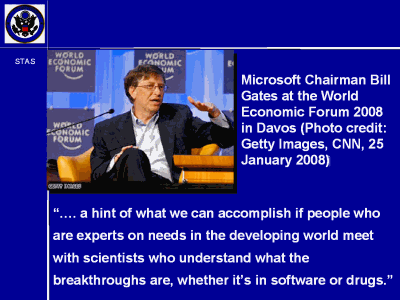| front |1 |2 |3 |4 |5 |6 |7 |8 |9 |10 |11 |12 |13 |14 |15 |16 |17 |18 |19 |20 |21 |22 |23 |24 |25 |26 |27 |28 |29 |30 |31 |32 |33 |34 |review |
 |
But the idea of serving as a science diplomat is only beginning to get on the radar of the average scientist and engineer, whether in academia or in business. Bill Gates – arguable the most famous technocrat in the world – gave an extraordinary speech during the World Economic Forum last month in Davos. I quote from his speech: “Thirty years ago, 20 years ago, 10 years ago, my focus was totally on how the magic of software could change the world. …. “But” he said, “breakthroughs change lives primarily where people can afford to buy them….” “There are billions of people who need the great inventions of the computer age, and many more basic needs as well, but they have no way of expressing their needs in ways that matter to the market, so they go without.” “If we are going to have a chance of changing their lives, we need another level of innovation. Not just technology innovation, we need system innovation…..” Gates argues that we need to go beyond capitalism – which works on behalf of those who can pay – and beyond philanthropy and government aid – which are the traditional means of helping those who cannot afford to pay. He says: “….to provide rapid improvement for the poor *we need a system that draws in innovators and businesses in a far better way than we do today.” Gates cites examples ranging from the development of software for people who cannot read and write to developing vaccines at a price that Africans can afford to pay, concluding that such projects *“….provide a hint of what we can accomplish if people who are experts on needs in the developing world meet with scientists who understand what the breakthroughs are, whether it’s in software or drugs.” And he might have added agriculture, as well. Gates is saying that we need to go beyond current concepts of engaging companies with governments and philanthropic organizations – these are called “public-private partnerships” in today’s development lingo. He is suggesting that we need to develop a new business model that would allow a combination of the motivation to help humanity and the profit motive to drive development. He’s calling it “creative capitalism,” capitalism leavened by a pinch of idealism and an altruistic desire to better the lot of others. Scientists play a key role in this concept. Gates belongs to the business world, while many scientists and engineers find their home in the academic world. Academia has a different reward structure than the business world. In most research organizations and universities, the major measure of success for scientists is scholarly papers published – and the quality of the journals in which they appear. While global engagement is already a central part of what many agricultural and public health scientists do, it is not so common for scientists in the basic sciences and mathematics and engineering. But here's one example. |